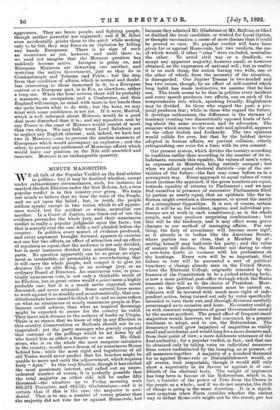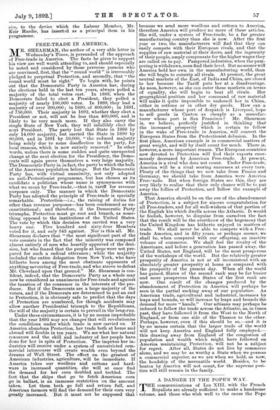MINUTE MAJORITIES.
WE all talk of the Popular Verdict as the final arbiter in politics ; but it may be doubted whether, except under extraordinary circumstances, such, for instance, as -marked the first Election under the first Reform Act, a true popular verdict is in this country ever given. We train our minds to believe that we hear the voice of the People, -and we act upon the belief ; but, in truth, the people seldom speaks except in two voices, which to all appear- s,nce would, but for accident or whim, neutralise one another. In a Court of Justice, nine times out of ten the %evidence persuades the whole jury, and their unanimous verdict is really a popular judgment upon the facts ; but that is scarcely ever the case with a suit pleaded before the country. In politics, every morsel of evidence produced, and every argument brought forward, appears to exercise not one but two effects, an effect of attraction and an effect of repulsion so equal, that the audience is not only divided, but in most instances divided into something like equal parts. No question apparently can be so great, no argu- ment so irresistible, no personality so overwhelming, that it will carry the whole people, and compel it to give its .decision like an able King, or an average jury, or an ordinary Board of Directors. An unanimous vote, or prac- tically unanimous vote, is not only a thinkable result of an Election, but in great crises would a priori seem a highly probable one ; but it is a result never expected, never discussed, and never attained. Some natural force seems to work against it so steadily and so automatically, that con- stitutionalists have ceased to think of it, and no more reflect on what an unanimous or nearly unanimous people or Par- liament could achieve, than what an inspired Sovereign might be expected to secure for the country he ruled. hey leave such dreams to the authors of books on Utopia. 'There is no reason that we know of why in any Election in -this country Conservatives or Radicals should not be ex- tinguished; yet the party manager who gravely expected that outcome of the pollings would be set down by all -who heard him as either a fanatic or an ass. Mr. Glad- stone, who is on the whole the most sanguine calculator in the country, would never dream of an unanimous House 'behind. him ; while the most rigid and lugubrious of all uld Tories would never predict that his benches might be unable to move and carry the adjournment, which requires forty "Ayes." In this very Election, though it has excited the most passionate interest, and called out an unpre- cedented number of voters, it is perfectly possible that the total majority on either side will be under fifty thousand—the numbers up to Friday morning were f391,572 Unionists, and 913,52,5 Gladstonians—and it is certain that if this is the case, the majority is acci- dental. That is to say, a number of voters greater than the majority did not vote for or against Home-rule, but because they admired Mr. Gladstone or Mr. Balfour, or liked or disliked the local candidate, or wished for Local Option, or thought vaccination a cause of more disease than it could be proved to cure. No popular verdict will have been given for or against Home-rule, but two verdicts, the one of which would, if other "cries " were excluded, neutralise the other. To avoid civil war or a deadlock, we accept any apparent majority, however small, or however obtained, as the expression of national will ; but in reality it is no such thing, the nation having two wills, one or the other of which, from the necessity of the situation, is disregarded. Our Jupiter Tonans is two-headed and has two voices, though, by an effort of self-control which long habit has made instinctive, we assume that he has one. The truth seems to be that in politics every incident and every speech produces two effects, one on each of the temperaments into which, speaking broadly, Englishmen may be divided. In those who regard the past, a pro- posal produces fear; while in those who regard the future, it develops enthusiasm, the difference in the streams of tendency creating two diametrically opposed kinds of feel- ing about the same occurrence, and its advocates. The measure which seems to the one safe and splendid, appears to the other foolish and foolhardy. The two opinions would collide for ever, but that by the boldest device adopted in human affairs, we prevent collision, utterly extinguishing one voice for a time, with its own consent.
Our present system, which divides the country according to tradition rather than according to the number of its in- habitants, conceals this equality, the values of men's votes, as expressed in Members, being entirely unequal ; but when we adopt equal electoral districts—one of the cer- tainties of the future—the fact may come before us in a peremptory way. Every approach to equal values of votes must increase the approach, if the gross numbers are equal, towards equality of returns to Parliament ; and we may find ourselves in presence of successive Parliaments filled by parties so nearly equal, that an epidemic like the in- fluenza might overturn a Government, or arrest the march of a triumphant Opposition. It is not, of course, certain that it will be so, for accident, caprice, and individual pre- ference are at work in each constituency, as in the whole people, and may produce surprising combinations ; but this will be the tendency, and it may effect some grave changes in our method of managing affairs. For one thing, the duty of attendance will become more rigicl, as it already is in bodies like the American Senate, where parties run so close, that a Member by at. senting himself may half-ruin his party ; and the value of oratory will decline, the Member not daring to obey a new-born doubt at variance with his professions on the hustings. Every vote will be so important, that failure to vote will be accounted a sort of political treachery, a change already seen in the United States, where the Electoral College, originally intended by the framers of the Constitution to be a picked selecting body, is now a mere political post-office through which the States transmit their will as to the choice of President. More- over, as the Queen's Government must be carried on, Cabinets will be invested with much more right of inde- pendent action, being turned out only by votes specifically intended to turn them out, and through divisions carefully prearranged as to occasion and hour. No country could go on with constant resignations of great Governments caused by the merest accident. The grand effect of frequent small majorities would, however, we feel convinced, be a greater readiness to adopt, and to use, the Referendum. The democracy, would grow impatient of majorities so visibly small and accidental, and would long for a more decisive and, from their point of view, a more deliberate utterance of the final authority; for a popular verdict, in fact; and that can be obtained only by taking votes on individual measures from voters undistracted by the lumping, as at present, of all measures together. A majority of a hundred thousand for or against Home-rule or Disestablishment would, at all events, look respectable, though it would still only show a superiority in its favour or against it of one. fiftieth of the electoral body. The weight of argument has long been in favour of the Referendum, which is, in fact, a transfer of the power of Veto from the Crown to the people as a whole ; and if we do not mistake, the drift of things is going in the same direction. It is a signifi- cant symptom when Peers consider whether the easiest way to defeat Home-rule might not be the resort, pro hoc vice, to the device which the Labour Member, Mr. Keir Hardie, has inserted as a principal item in his programme.



















































 Previous page
Previous page